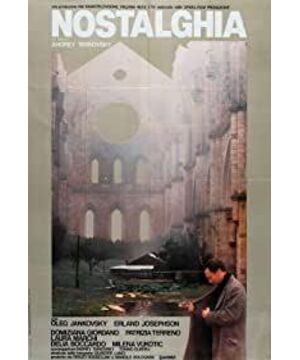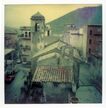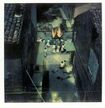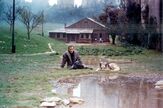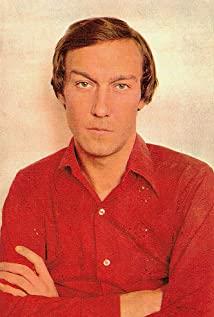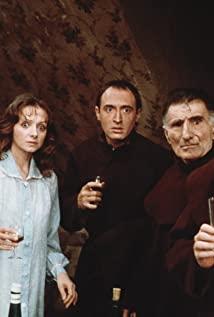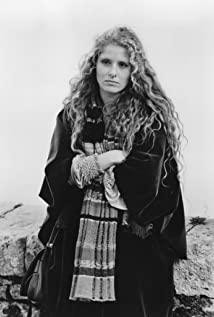(The article was originally written as a pre-aesthetics class. If you are a novice, please correct me for any inappropriate understanding.)
I like a director like Tarkovsky very much - he is retrospective, emotional, spiritual, who can easily put people into a certain emotion, has his own understanding and grasp of time, and can be freely retracted and just right. Many predecessors have discussed it from a more professional point of view, and here I try to sort out the film from a thematic point of view.
I think nostalgia has two main meanings in the film, one is nostalgia in terms of geography and culture, and the other is nostalgia in spirit and belief. Geographical nostalgia is evident, and the poet left his homeland and came to Italy with a deep nostalgia for his native Russia. This thought is reflected in the details, just like a scene where the poet subconsciously raised his left hand in the room to turn on the bathroom light, but only felt the moment of trance on the white wall. Even when he was walking among the stone pillars of Italian buildings, the camera panned slowly, and when he looked up, he still thought of the birch forest in his hometown. The poet has always carried the arrogance of wandering. In another long shot, he turned his head and a feather fell, which was against the dazzling white in his hair. There is no special meaning in this scene, but it makes People are unreasonably emotional. The film keeps flashing back to the poet's dream, his family standing on a hillside and looking into the distance, as a child he ran to the swamp with the big dog, and the gray-white mist lingered. Sometimes he can't even tell the difference between dream and reality. The child in the dream has become a grown-up poet, sitting under the tree in his hometown with the big dog. In the dream, the white horse with its neck outstretched to graze appears in the background again and again. His nostalgia is elusive, but it is always present, and the richness cannot be dissolved. It is all accumulated in the heart, and it turns into the silence and stares in the long shot - the rainy Italy, he opened the window, let the wind in, and was absent-minded. Lying on the hotel bed, with the long and dull sound of rain, his heart floated far, far away.
Another layer is the nostalgia of belief. Dominica believes in Christianity and advocates returning to nature, hoping that people will return to nature and be redeemed. He imprisoned his family for seven years for fear that they would be polluted by the evils of the world. The film was shot in 1983, at a time when human beings had already entered modern civilization, and the fast-paced life activities shook the beliefs that have been passed down for thousands of years. Like Andre, as intellectuals, they both have a sense of alienation from the world. They are misfits and are out of tune with the times. At the end of the day, Dominic gave a speech in front of the church, shouted loudly, hoping to awaken people's numb hearts, and finally set himself on fire in the music of Ode to Joy. But his behavior only got people's indifferent comments. Everyone stood on the steps with expressionless faces, and even only cared about whether his lighter was lit or not, whether the music was played in time, just regarded him as a performance art, and even more so. The opposite highlights their loneliness. Spring water and candlelight are important metaphors in the movie. Spring water is life, and candlelight is redemption. Andre and Dominic, who exhausted their lives with candles and walked to the other side of the pool, are essentially two sides of one body. This behavior of Andre has a sense of religion and ritual. It is an affirmation and inheritance of Dominic. When he finally put the candle on the stone wall, he actually completed his redemption.
Wordsworth said: "Poetry arises from the emotions that come after the quiet." Rather than calling "Nostalgia" a movie, it's better to call it a poem. I always feel that Tarkovsky is one of the few people who has inadvertently spied the secrets of the human mind. Although the film "Nostalgia", although the name is "Nostalgia", it contains more than a simple nostalgic expression, it is more A sad look back at the loss of human spiritual homeland. To appreciate this film, you don’t need to be burdened by scholasticism, and you don’t need to dwell on symbols and metaphors—the director himself spurned them. You just need to simply experience the visual enjoyment brought by images, and immerse yourself in the beautiful photography that is as beautiful as prose and poetry. Switch between black and white and color, and even fall asleep, until I wake up at a certain moment, I see spring water, the swaying of emerald green water plants, I see churches, stone pillars, dilapidated houses, I see a pair of hands pulling candles, taking you through the pool , go to the other side. Sometimes you also think about things, about belief, modernity, human loss or redemption, but you seem to be thinking about nothing, as if your heartbeat is suppressed by the moonlight, everything is light, light, only the candles on the other side. The fire is on, time is slowing down, and things are silently telling themselves, "Chaowen wanderer sings the song of Li, last night was slightly frosty and first crossed the river", so you remembered again, it's time to hit the road.
The hometown, in retrospect, has always followed not far or near.
View more about Nostalghia reviews


